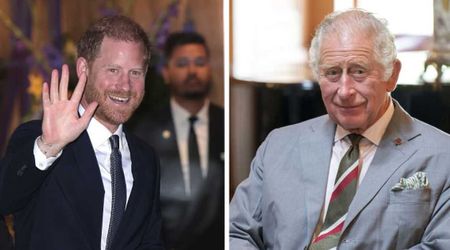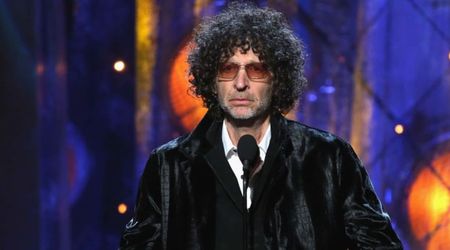NHL star Stephen Peat dies following 'tragic accident' just weeks after Johnny, Matthew Gaudreau's deaths

WASHINGTON, DC: The hockey community was dealt a heavy blow with the news of former Washington Capitals forward Stephen Peat's passing. Peat, who was just 44 years old, died on Thursday, September 12 — leaving behind a stellar legacy both on and off the ice.
The tragedy was revealed by the NHL Alumni Association (NHLAA) on Thursday, September 12 through a post on X (formerly Twitter). The association shared that Peat—who had been an enforcer during his time in the NHL—tragically succumbed to his injuries following an accident that occurred just over two weeks prior, People reported.
The NHL Alumni Association is heartbroken to learn that Stephen Peat has passed away from his injuries after a tragic accident just over two weeks ago. He was only 44 years old.
— NHL Alumni (@NHLAlumni) September 12, 2024
Stephen was drafted 32nd overall by the @AnaheimDucks in 1998. In 2000, he was traded to the… pic.twitter.com/sjbWx3VuV2
While the details surrounding the incident remain undisclosed, the NHLAA confirmed that Peat’s legacy will continue remarkably through organ donation. “Stephen will be helping to save numerous lives through organ donation,” the association confirmed.
The NHLAA extended their deepest sympathies to those who knew and loved Peat.
“We send our deepest condolences to Stephen’s family, friends, and former teammates during this difficult time,” they shared, a sentiment echoed by the Washington Capitals. The team also extended condolences in a post on X. “Our thoughts are with his loved ones during this difficult time," they wrote.
The Washington Capitals extend their heartfelt condolences to the family and friends of former Capitals player Stephen Peat. Peat played 130 games in the National Hockey League, all with Washington from 2001-05.
— Washington Capitals (@Capitals) September 12, 2024
Our thoughts are with his loved ones during this difficult time. https://t.co/RftfwaqqAa
A promising career cut short
Born on March 10, 1980, in Princeton, British Columbia, Stephen Peat was destined for the ice. He began his hockey career at the young age of 15, playing in Canada’s Western Hockey League (WHL). His talent became clear rather early on, leading him to be drafted third overall in the 1995 WHL bantam draft.
Over the next five years, Peat showcased his skills with the Red Deer Rebels, Tri-City Americans, and Calgary Hitmen — racking up 11 goals and 36 assists in 203 games, per Hockey Draft Central.
Peat's hard work paid off when he made the jump to the NHL in 1998, drafted by the Anaheim Ducks with the 32nd overall pick. Before he made his mark in the NHL, however, Peat spent a year honing his skills with the Portland Pirates in the American Hockey League (AHL).
It wasn’t long before he was traded to the Washington Capitals, where he played from 2001 to 2005. During his time with the Capitals, Peat became known not just for his offensive contributions—eight goals and two assists in 130 games—but also for his role as a tough enforcer.
Peat’s professional hockey career came to a quiet end in 2006 after playing just one game with the Albany River Rats, a former AHL affiliate of the New Jersey Devils. Albeit his time on the ice was relatively brief, Peat left an indelible mark on the sport and those who knew him.

Toll of a dangerous profession
While Stephen Peat’s career brought him fame and success, it also came with a heavy price.
In a candid 2016 interview with the New York Times, Peat opened up about the toll that hockey had taken on his mental and physical health. He revealed his fears of possibly suffering from chronic traumatic encephalopathy (CTE), a degenerative brain disease caused by repeated blows to the head.
CTE can only be accurately diagnosed after death — something that haunted Peat as he reflected on his years as an enforcer. The Mayo Clinic describes CTE as a condition that can lead to memory loss, confusion, impaired judgment, and severe mood swings—symptoms that many former athletes have reported.
“Hockey’s been the greatest thing in my life, but it’s also been the worst thing in my life,” Peat told the Times. “It was great while I was playing, but what has it done lately? My peers of enforcers have become statistics and the NHL is in denial. They’re denying that the job I did even existed, even though I sacrificed my quality of life, my well-being, and my future greatly by being there for my teammates in the present.”

Peat’s struggles didn’t end on the ice. In 2015, he pleaded guilty to arson by negligence after a fire broke out at his father’s house in March of that year. In November 2017, his father Walter Peat sought a no-contact order against his son, citing concerns over Stephen’s increasingly violent behavior.
Walter believed that his son’s violent tendencies and severe headaches were the result of his years playing in the NHL. Stephen, however, refuted these claims during a follow-up interview with the Times in 2017. “I am disappointed in my father since I once held him so high on a pedestal,” he said at the time.
A tragic pattern
Stephen Peat’s tragic death is part of a troubling pattern. Just weeks before Peat’s passing, the NHL community was shaken by the deaths of NHL star Johnny Gaudreau and his brother Matthew. The Gaudreau brothers, aged 31 and 29, were struck and killed by a suspected drunk driver while riding their bicycles in New Jersey on the eve of their sister Katie’s wedding.
Johnny Gaudreau — affectionately known as “Johnny Hockey” — was a beloved player for the Columbus Blue Jackets. Meanwhile, Matthew played for the Reading Royals, an affiliate of the Philadelphia Flyers in the ECHL.










